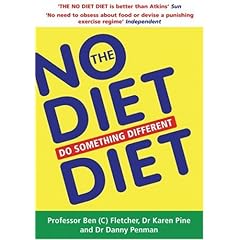Do Something Different 1

Never judge a book by its cover...
Would you buy this book? Never in a million years. It looks like part of that wall of dumb you find in bookshops under self-help and New Age.
But I bought it. Not because I need to lose weight, but because the author is a serious, respectable psychologist, Professor Ben Fletcher, whose work includes one particularly remarkable discovery. And he describes it very clearly in this book, which makes it worth having even if you've never had a day's problem with your weight, like me.
Fletcher works in what's called behavioural psychology. He's spent a lot of his career wondering about and working with people and their habits, particularly those stuck with chronic habits and problems. What he's discovered is that habits get the better of us because we make one mistake in understanding them - we look at them one at a time. Rousseau (think it was him) once noted that a society always has all of its rules and laws at once. Each law is part of a web of laws, so that none exist separately to any of the others, they are always mutually implcated in one another. Fletcher realised the same thing applies to our habits - they are always linked. All of our habits together constitute what he calls a habitweb.
Any habit you have is actually linked via this web to every other habit you have. The reason we generally fail to overcome chronic habits is that we're only prodding at that one part of the web, when in fact what sustains the habit is everything else we're doing in our lives. Once Fletcher realised this, he did something that seems utterly bizarre and pointless to our usual way of thinking - he completely ignored the specific habit that a person was struggling with and instead got them to change tiny things in other (unproblematic) habits in their lives, like where they sat for lunch, the route they drove to work, what shoe they put on first in the morning etc. The outcome was amazing - people who did this saw their chronic habits dissolve, without knowing how or why. To their mind they hadn't paid any attention to this chronic problem at all, they hadn't done anything about it. And yet by changing these other seemingly unrelated and minor things, their chronic problem disappeared.
This is where we can come back to the idea of a person not being a mind and a body. Fletcher interprets what happens in his work using behavioural psychology, but the implications are much broader. To quote Fletcher:
The power of negative habits is well known to psychologists. Most have tackled them by persuading their clients to try and change their way of thinking. But you can't just change how you think or feel...Time and time again, research has shown that the best way to break peoples' habits is to get them to behave differently. It's much easier to make small changes in the things that you do rather than trying to change your whole way of thinking.
Fletcher is making the case for the importance of behaviour in psychology, which is a response to the increasing cognitive (i.e. 'thinking') bias in the field. But it's bigger than that, you can see here that it's the everyday activities we're involved in that can determine how we think. Change the activities you're engaged in in small, even tiny ways, and it flows right through into how you think about things as well.
This (to me) is the way out of the minefield of 'bodywork' and 'mindwork' techniques. And even out of the false salvation of placebo, of mind 'influencing' body. The 'whole person' is always engaged in simple, everyday activities, and what they think and how their body responds is completely woven into this same pattern. To effect change in a life simply change the activities, in simple ways. No need to 'understand' your problems, why would you try to extract some abstract thing called an idea out of this whole pattern of activity? The proof of the folly of out-thinking thinking is the increasing number of cognitive disorders where the sufferer is completely, intimately aware of the silliness and inaccuracy of their ideas, and yet it provides not the slightest liberation.
Also the changes that can be brought about by doing these simple, common sense things (captured in wise sayings like 'a change is as good as a holiday', or 'a change would do you good') is right down to the smallest bits of your 'body', proving again that these patterns of our lives have no time at all for any silly splitting of bodies from worlds, or minds from bodies. To quote Fletcher again, describing work undertaken by the Institute of Psychitary at the University of London:
...a therapy in which people were asked to create new ways of behaving in situations that caused them unhappiness. The simple changes they made were incredibly successful in reducing subsequent disease and death rates from cancer and heart disease. They also reduced the number of days absent from work and spent in hospital. And, amazingly, the changes prolonged the lives of those already suffering from cancer.
More on all this next time.


Comments
Post a Comment